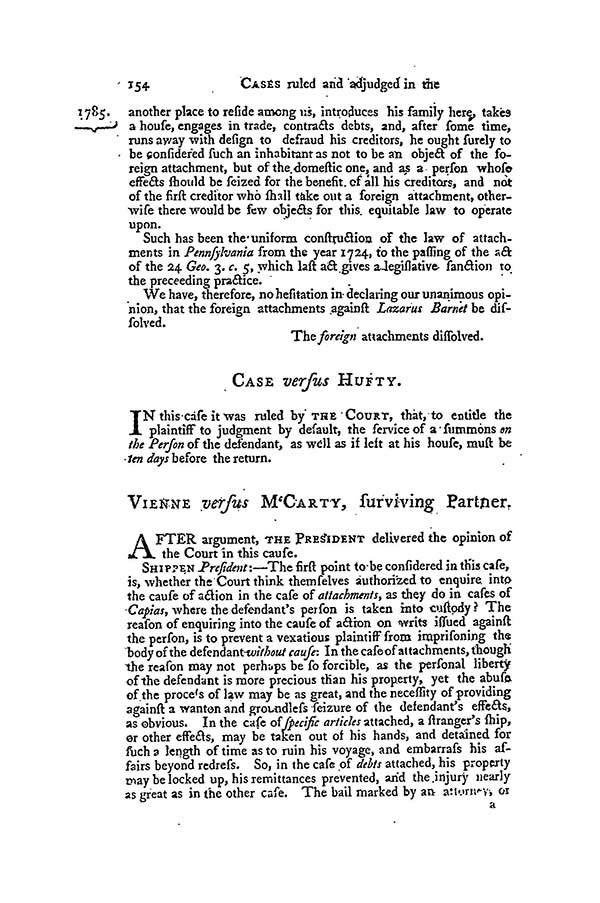Lazarus Barnet's Case, 1 Dall. 152 (C. P. Phila. Cty. 1785)
Common Pleas, Philadelphia County.
December Term, 1785.
Lazarus Barnet's Case.
Lazarus Barnet having absconded, several foreign attachments were issued against him; and, afterwards, motions were made to set them aside respectively, in favour of a domestic attachment, which had, likewise issued against him. These motions were all founded upon the following affidavit. "Daniel Benezet maketh oath that on or about the 12th day of May 1783, the deponent let his house in Second Street Philadelphia to a certain Lazarus Barnet; that the said Lazarus Barnet has resided therein and followed the business of a Merchant or Store-keeper from that time 'till about two weeks ago, when the said Lazarus absconded from the city, or secreted himself therein, as this deponent is informed. And this deponent further saith, that the said Lazarus Barnet appeared to him to be a married man, and having a family and servants in his house." Sworn the 11th of December, 1784.
This case was argued on the 20th of January by Sergeant and Levy against the foreign attachments; and Wilson and Ingersol in support of them. On the 27th of the same month, The President delivered the unanimous opinion of the Court.
Shippen, President.—The question before us, is, whether the foreign attachments, or the domestic attachment, issued against Lazarus Barnet, shall be established? The arguments in support of the foreign attachments, are chiefly founded on the third clause in the first act of Assembly, which says that "no writ of attachment shall be granted against any persons effects, but such only as, at the time of granting such writs, are not resident, or residing, within this province;" and on that of the second act, which leaves non residents to be proceeded against by foreign attachments, agreeably to the directions of the first act. And it is urged, that, in the present case, it does not appear, that Lazarus Barnet was resident or residing within the state at the time of granting the domestic attachment, and, if he was not so resident, he is the object of the foreign attachment law.
Our opinion on this case, must be founded upon a connected view of the several acts of Assembly relating to attachments; and these are the 4 Ann. c. 28. the 9 Geo. 1. c. 3. and the 14 Geo. 3. c. 5.
The object in passing the first act, was to subject the effects of absent debtors to the payment of their debts; as it appears by the preamble, that before that time, they were not equally liable with the effects of those persons who resided on the spot. Within the provisions of that act, three sorts of debtors were included: 1st. Those who never resided here, or whose actual residence was abroad. 2nd. Those who had resided here, and had absconded, or otherwise removed; both of which are comprized in the general description of non residents in the third clause of the act; and 3rd. Those who
The last clause of the second act provides, that "nothing in this act shall be construed to exempt the goods or effects of any person or persons, not inhabitants of this province, from being attached according to the directions of the former act." Here appears a designed variation from the expression used in the first act: it does not say persons not residing in the province at the time of issuing the attachment, but, generally, persons not inhabitants of the province, and seems expressly meant to take in only those persons first described in the former act, persons who never resided here, or whose actual residence was in another country. A contrary construction would defeat the general intention of the Legislature, as in most cases those debtors who escape from their creditors, go out of the state. Nor is it material as to the policy of the act, whether he remains in the state or goes out of it; he has committed an act similar to an act of bankruptcy by absconding with a fraudulent design; and in that case, and in that only, is he the object of the second act.
The word "inhabitant" has a plain meaning. A person coming hither occasionally, as a captain of a ship, in the course of trade, cannot be called an inhabitant; nor does a person going from his settled habitation here, on occasional business to Boston, or any other place, cease to be an inhabitant. But a man who comes from
Such has been the uniform construction of the law of attachments in Pennsylvania from the year 1724, to the passing of the act of the 24 Geo. 3. c. 5, which last act gives a legislative sanction to the preceeding practice.
We have, therefore, no hesitation in declaring our unanimous opinion, that the foreign attachments against Lazarus Barnet be dissolved.
The foreign attachments dissolved.
Citation: Lazarus Barnet's Case, 1 Dall. 152, 1 U.S. 152 (C. P. Phila. Cty. 1785)



Last modified: December 5, 2014